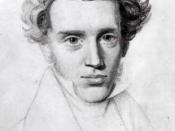Soren Kierkegaard is said to be one of the "founding fathers" of existentialism. His style of writing, his tone and vocabulary tie him closely to another forerunner of existentialist thought: Fyodor Dostoevsky (although either of them would probably deny this vehemently). However, in the course of his writings, Kierkegaard takes quite a liberal and (dare I say it?) individualistic stand on the side of Christianity. In the passages I have read of Kierkegaard ("That Individual" and "Truth is Subjectivity"), he puts forward two basic themes which seem to be his "driving force" behind each piece respectively. It is behind these themes that Kierkegaard makes his forceful drive to discover the "eternal truth" and the paths which lead us there.
Kierkegaard wastes no time in setting the tone for the first selection, "That Individual". Right away he starts his discussion on the "crowd", which he states early on is (in its very concept) the untruth.
In a crowd, the vociferation and frenzy of that crowd often drowns out the truth, even if each member of that crowd has individually obtained the truth . Kierkegaard makes the statement that "only one attains the goal", in that we all are capable of obtaining said goal (in this case the eternal truth) if we each seek after the goal as individuals. In crowds, he says, it is sure that no one is working, living, striving for the highest aim, but only for one or another earthly aim. Only as individuals (with God as our helper) can we obtain that which is the absolute, eternal truth. In these beginning paragraphs, Kierkegaard has already set his theme for this passage: that only as individuals with the help of God can one achieve the goal, or "eternal truth", that is Christianity.
As we delve deeper...


